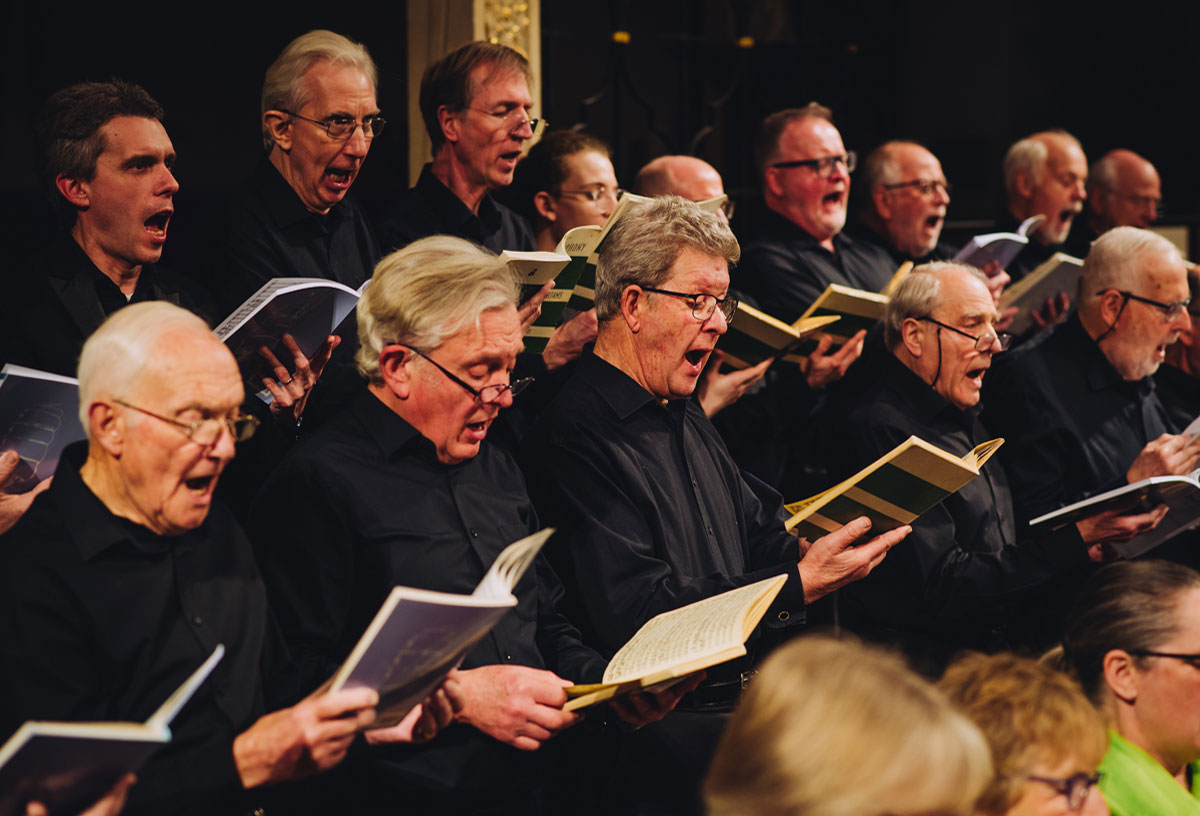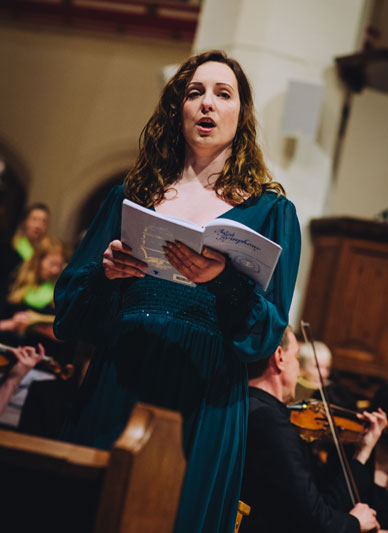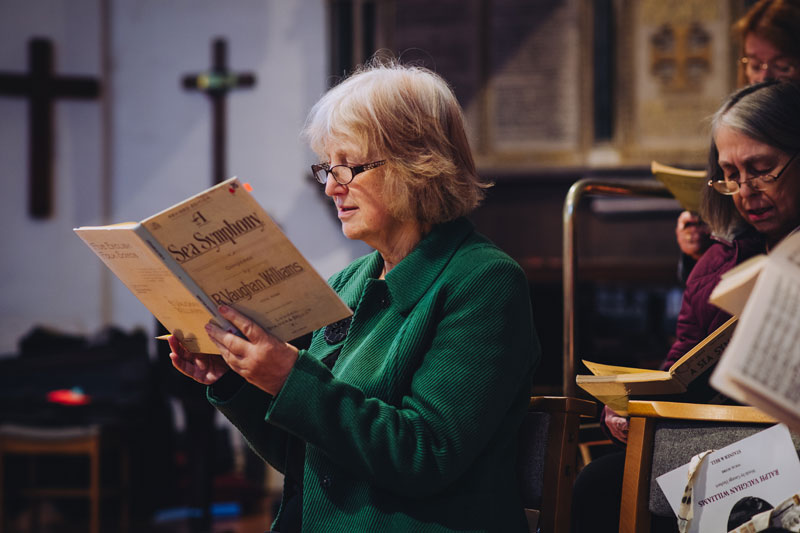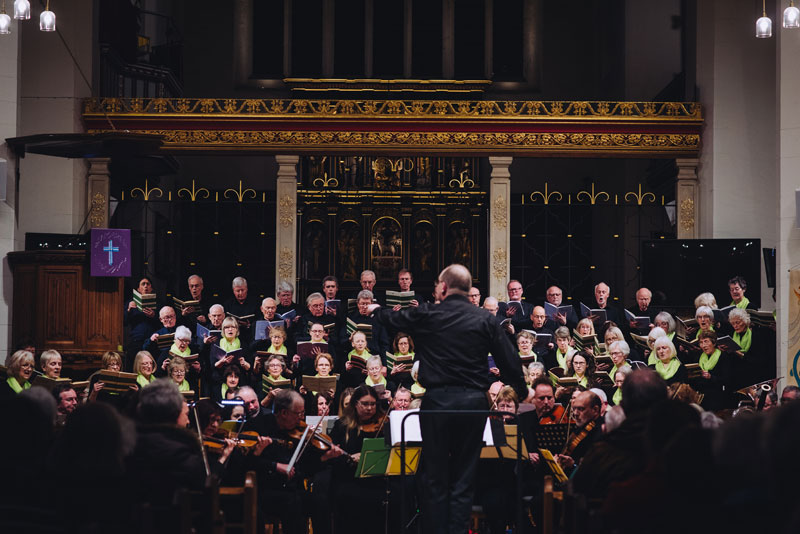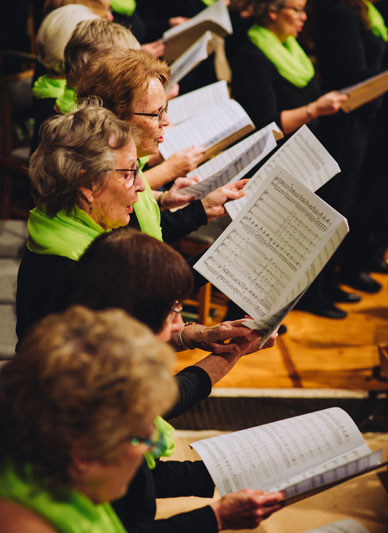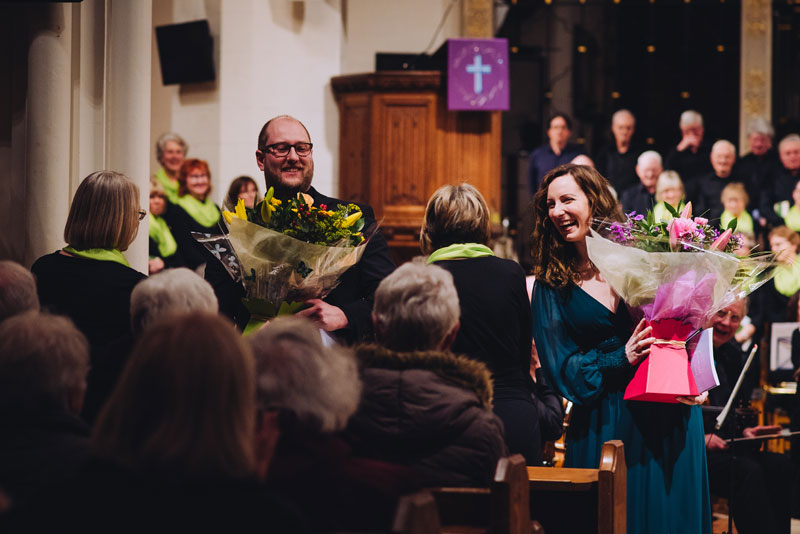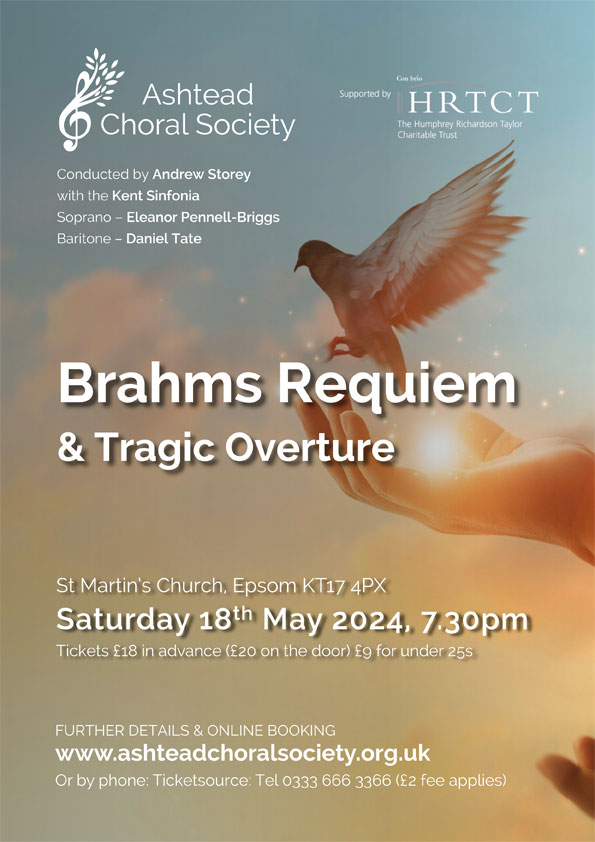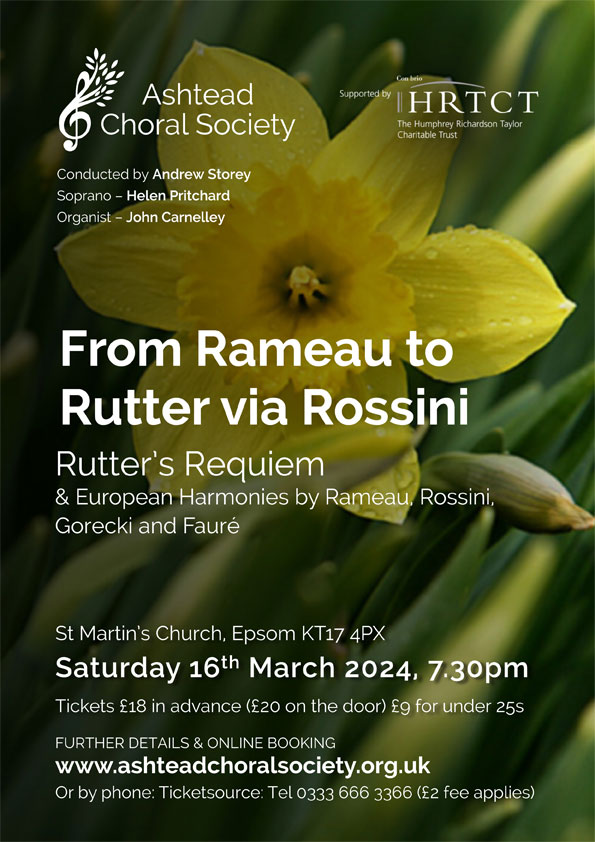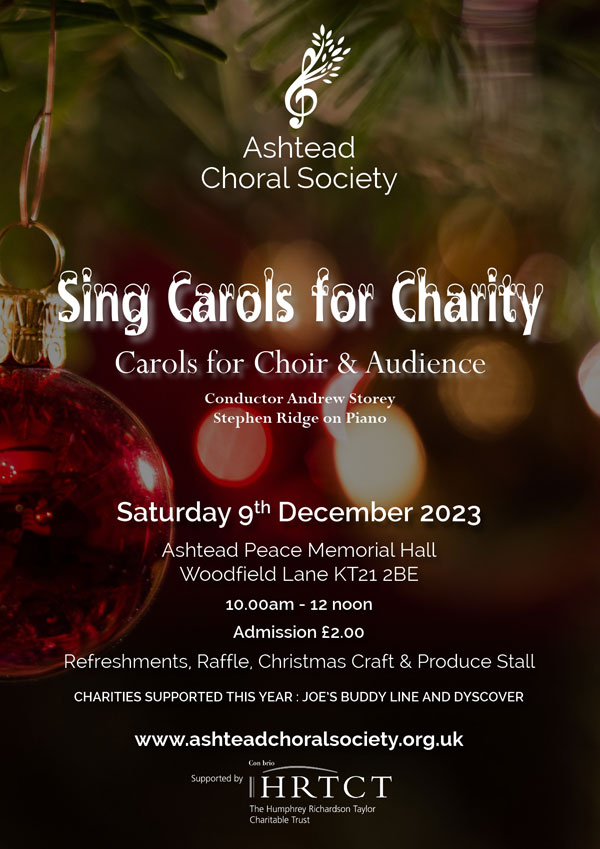Recent Concerts & Reviews
ACS UMBRIAN TOUR
May 2024
On Wednesday 29th May we travelled to our hotel in Chianciano Terme in Italy to begin a 5-day sight-seeing and concert tour. Three concerts were given at the cathedrals of Citta della Pieve, Perugia and Pienza. We were accompanied by our Musical Director Andrew Storey, soprano soloist Helen Pritchard and organist John Carnelley.
Here are a few photos from this amazing tour!
(click on any one for slide show)
Ashtead Choral Society
Brahms Requiem
18 May 2024
If you live in north Surrey, you are lucky to have such a busy and vibrant music scene with so many concerts given by so many different groups at so many different venues. Quantity is one thing but Ashtead Choral Society’s Brahms concert on 18 May in Epsom highlighted the sheer quality and professionalism we also have available locally.
Kent Sinfonia set the tone for an emotional evening with Brahms Tragic Overture. From Dr Andrew Storey’s first down beat we knew that the orchestra was as one in committing to Brahm’s journey of light and dark. Being a church, St Martin’s does not have great sight lines for all seats, but the monitors allow the audience to observe up close what is going on, and it felt like Storey was able to give Kent Sinfonia space to play, stepping in to only to encourage and finesse at key moments.
That brought us to Brahm’s German Requiem. We knew Kent Sinfonia were up for a night of high emotion, and the choir were not to be outdone with their first haunting ‘Selig sind’ (blessed are they) which developed into two wonderfully evocative movements delivered by choir and orchestra. The well-known second movement – ‘Denn alles Fleisch ist wie Gras’ (All flesh is a grass) – was delivered with purpose, building to promised ‘joy and gladness’. Talking of quality, it was good to see the baritone, Daniel Tate, and soprano, Eleanor Pennell-Briggs back in Epsom for this event. Tate’s appearance saw him work his intonement, ‘Lord, make me to know mine end’, building with the orchestra and choir to a long, glorious final fugue from Storey, into which players and singers flung themselves.
After a welcome glass of wine, the choir eased us back into Brahms’ journey with the motet-like ‘How amiable are thy tabernacles’ before Pennell-Briggs gave us the comfort promised by the fifth movement with mesmerizing tenderness and simplicity. Tate’s return portended more drama, and the choir did not disappoint, with cries of ‘death where is thy sting?’ from which Storey set up a triumphant ‘Thou art worthy, O Lord, to receive glory and honour and power.’ This might have been a fine hopeful and triumphant end to the work, but Brahms gives us a final seventh movement ending as he starts with a reprise of the tender ‘selig sind’ motif from which Storey eased us to final ‘rest from our labours’ as Brahms’ epic melted into peace.
ACS is commemorating Remembrance Day in Epsom on 9 November and I have no doubt their assembled forces will provide another great evening of quality music with their programme of Haydn’s Nelson Mass and Faure’s Requiem.
Jane Pickles, 19 May 2024
Ashtead Choral Society
From Rameau to Rutter via Rossini
16 March 2024
I don’t know about you, but when I open my Spotify application to listen to music, I am immediately drawn to the familiar where one finds comfort and pleasure. The glory of this programme was to take the audience on a spiritual journey from the less familiar Catholic Baroque to the well-known glory of the modern English church tradition.
You will find it difficult to find a recording of Rameau’s Blow the Trumpet. One wonders why as this joyful opening set the scene invigoratingly for the evening, bringing together the full forces of choir, organ and soprano, Helen Pritchard.
If you were at the last ACS concert, you will have enjoyed the rich, operatic dramaticism of Rossini’s Petite Messe Solennelle. This time we were treated to three of his glorious motets in the same vein, with Musical Director Dr Andrew Storey making the most of the sacred setting and acoustic of St Martin of Tours and the powerful shifts in expression offered by Rossini.
Helen Pritchard’s solo performance moved us firmly into the early 20th century with a rare opportunity to experience Vierne’s Les Angelus song cycle, in which John Carnelley’s shimmering organ playing underpinned Pritchard’s effortlessly lyrical appeals to the Virgin Mary. This set the scene for another rarely heard classic: the intense homophonic simplicity of Gorecki’s incantation Totus Tuus. Storey created and sustained a mesmerising soundscape, still yet kinetic, and crowned with a resounding silence at the end of this evocative chant to the Virgin Mary.
Faure’s Pavane and Cantique de Jean Racine brought us back to the familiar and foreshadowed the last stage in the evening’s journey, Rutter’s well-known Requiem. Rutter went to France to view the original manuscript of Faure’s Requiem before he wrote his own, and Storey illustrated exactly why Rutter’s offering is a modern classic.
The choir dealt purposefully with the anguished chromatic calls for eternal rest that open the work, before resolving into the simple, lyrical beauty of Rutter’s requiem theme. In the psalm setting movements – Out of the Deep and The Lord is My Shepherd – the choir shifted seamlessly from simple lines shared between the parts, to glorious harmonies and well-delivered choral recitatives. Pritchard gave us grace and purity in Rutter’s Pie Jesu, soaring to heaven and back again from the pulpit. Storey gave a blazing Sanctus, an Angus Dei which tore at the heartstrings as he drove a crescendo of pleas to the Lamb of God from choir, and, finally, resolution and rest through the spare lines of the Lux Aeterna.
All in all, a tour of Europe, a tour of musical epochs, and a tour for the soul. Storey must have tours on his mind as he mentioned that ACS will be taking much of this repertoire on tour to Italy later this year. Bravo!
Jane Pickles, 17 March 2024
Petite Messe Solennelle
Rossini
4 November 2023
A heart-warming and celebratory work, bursting with humour, charm and sincerity.
Ironically, Rossini’s Petite Messe Solennelle (Small Solemn Mass), is neither small nor particularly solemn! A naturally witty composer, it was entirely characteristic of Rossini to play with his audience’s expectations in this way. Most famous for his 39 operas, it might also be no surprise that, in this ostensibly religious piece, the vocal writing is unashamedly operatic.
In this the great composer’s final work, the music ranges from hushed intensity to boisterous high spirits, and abounds with the memorable tunes and rhythmic vitality for which Rossini became justly famous. It is a heart-warming and celebratory piece, bursting with humour, charm and sincerity.
In this performance, the choir was accompanied by two pianos played by Stephen Ridge and Simon Phillips, and a harmonium played by Lucy Morrell. Our soloists were: Soprano – Lucy Cox; Alto – Susan Legg; Tenor – Adam Tunnicliffe; and Bass – Philip Tebb.
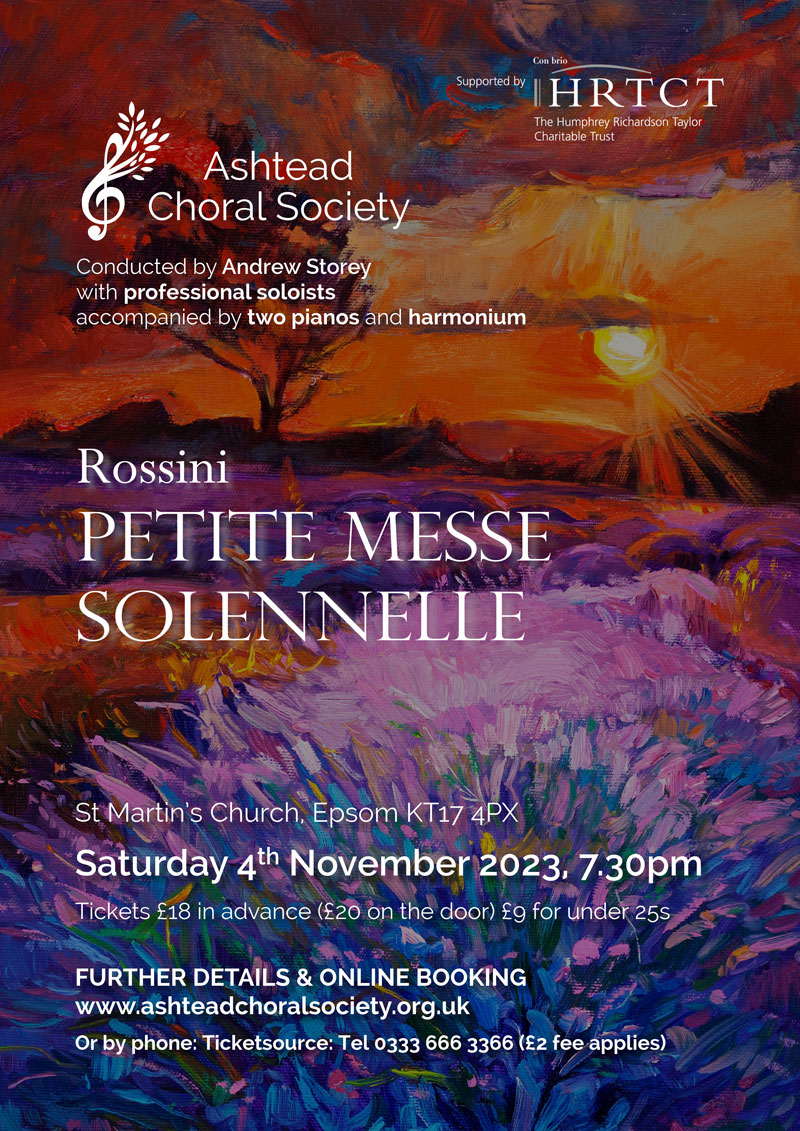
Ashtead Choral Society
Petite Messe Solennelle
Rossini
4 November 2023
Rossini’s singular foray into large scale religious choral composition, his ‘Small, Solemn Mass,’ is neither particularly solemn and certainly not small. Composed in 1863, more than three decades after his last opera, this work proved to be a captivating showcase for the Ashtead Choral Society. Their performance at St Martin of Tours church in Epsom was nothing short of remarkable, filling the space with a resounding richness and skilfully capturing the dramatic essence of the piece. The choir’s meticulous attention to the wide dynamic range inherent in the work promised the audience an evening of exceptional musicality and jollity.
Commencing with the Kyrie, the choir adeptly conveyed the dramatic nuances of the composition. The originally intended accompaniment of two pianos (Steve Ridge and Simon Phillips) gave the piece depth, with the cheeky addition of the harmonium (Lucy Morrell) lending a bold, brash Parisian flair to the performance. The Christe, nestled between the Kyrie movements, showcased Rossini’s mastery of polyphonic writing, with the choir executing a sotto voce Renaissance sound beautifully under the nuanced direction of their conductor, Andrew Storey.
The Gloria surged forth with intent and gusto, accompanied by impeccable diction from both choir and soloists – Lucy Cox (soprano), Susan Legg (alto), Adam Tunnicliffe (tenor), and Philip Tebb (bass). The quartet’s balanced delivery set the stage for individual moments of brilliance with each soloist shining in their respective movements that followed. Ridge and Phillips provided impeccable accompaniment and all the soloists held the audience’s attention throughout, despite the frequent repetition of material. The Gloria’s culmination, Cum Sancto Spiritu, showcased the choir’s operatic prowess, delivering long phrases with excellent shape, dynamic precision, and a deft handling of challenging rhythmic passages, leaving the audience breathless and ready for a break whilst anticipating more to come.
The second half commenced with the Credo and a robust entry by the tenors, imitated by a vibrant soprano sound calling the audience to “believe”. This contrasted sharply with the smoothness and softness of subsequent phrases, allowing solo and quartet interjections to make a profound impact. The complex yet enchanting Crucifixus, beautifully sung by Cox, set the stage for the choir’s triumphant return, Et Resurrexit, and a captivating ‘Et vitam venturi’ fugue concluded the Credo in grand fashion; the choir working hard to keep the sound clear and consistent and hold the audience’s attention. Morrell’s expert rendition of the Preludio Religioso on the harmonium preceded the choir’s flawless navigation of the challenging tonal shifts in the unaccompanied Sanctus, where once again the dramatic shifts in dynamics held the attention.
The final movement, Agnus Dei, unfolded in true Rossini fashion, blending the operatic melodic line and dramatic flourishes from Legg with seamless interjections of religious chorales by the choir. By the end, one could not help but believe that one was not in an opera house in Italy with the curtain about to fall. However, in a final twist the piece ended with quiet, delicately placed chords on the piano combined with the bite of the harmonium, thus leaving the listener guessing as to the religious nature of the piece. Maybe then a final word from the maestro himself as he mused in his original manuscripts, “Dear Lord, here it is finished, this poor little mass. Have I just written sacred music, or rather, sacrilegious music? I was born for opera buffa, as you well know. Not much technique, a little bit of heart, that’s all. Blessings to you and grant me Paradise.”
Ashtead Choral Society’s performance was a real cracker and fittingly full of vocal fireworks on bonfire night, leaving the audience with many tunes to hear over and over again as they went into the night.
Carmina Burana
Carl Orff
The Armed Man
Karl Jenkins
13 May 2023
Two classics of the 20th century choral repertoire were on the menu for our summer concert.
Most famous to many as the soundtrack for the Old Spice aftershave advert and films such as The Omen, Carmina Burana has become one of the most celebrated and performed works in recent history. Whereas The Armed Man is a relatively new work which has nevertheless become a choral classic in its short life.
We were accompanied by the Kent Sinfonia, with soloists Ana Beard Fernández (soprano), Richard Decker (counter tenor) and Rupert Pardoe (baritone).
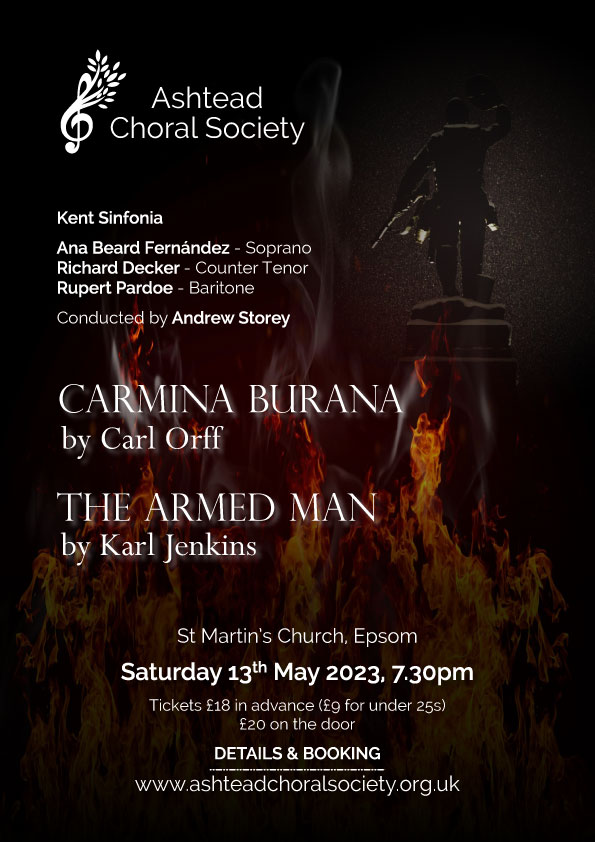
Ashtead Choral Society
Carmina Burana
Carl Orff
The Armed Man
Karl Jenkins
13 May 2023
Ashtead Choral Society began the evening with Carl Orff’s Carmina Burana. Written in 1936, this secular work has remained a favourite of many choral societies as it is great fun to sing and encompasses a wide range of musical genre and emotion!
The choir began with the punchy accents we know so well of the ‘O Fortuna’, filling the space of St Martin’s full of grandeur. The first male-only entry was strong and confident, as was the lamenting unison passage to follow. Then we heard the first of the fantastic Baritone soloist Rupert Pardoe, who shone with his clarity of lyric and tone. The choir returned to sing with great joy and spirit, aptly reflecting the ‘welcoming of spring’ in the text. The Tanz, or dance, gave the Kent Sinfonia a moment in the spotlight, with especially lyrical pizzicato from the strings and the first of many incredible flute solos, again beautifully reflecting the tone and content of this meadow dance. Now into the ‘Floret Silva Nobilis,’ the sopranos tackled those pianissimo high notes with tremendous grace – I know how hard those are myself! Both choir and orchestra injected some energy into the ‘Swaz Hie Gat Umbe,’ before switching to a more calming and melodic timbre, again supported and balanced by the flute melody.
The energy returned, and the choir sang regally on ‘Were diu welt all min,’ leaning in on the outrageous storytelling about the Queen of England, and what a great ‘Hej!’ at the end of the passage! Speaking of storytelling, what a performance from the countertenor, Richard Decker! Aside from the fantastic singing, the facial expressions of the soon-to-be-roasted swan told us of the dread and terror (and slight comedy) of the situation! On to the men’s time to shine, in the Tavern, which they sang very well with clear diction and gusto, and finally we were joined by the soprano soloist Ana Beard Fernandez. Her projection was especially impressive in the pillared setting of the church, and the duet with the flute was a particular highlight. ‘In trutina’ is widely considered the most beautiful moment of the work and Fernandez’s rendition definitely lived up to this claim. The energy began to return for both choir and orchestra in the drive up to the finale, finishing with the reprise of the ‘O Fortuna’ with the same energy and punch as at the start.
In the second half of the evening, the choir sang ‘The Armed Man’, by Karl Jenkins. He is known for a wide range of work, recently having composed for the King’s Coronation, but this piece is his most widely-sung setting, originally written for the millennium, and subtitled ‘A Mass for Peace.’
It began with a strong drumbeat to set the military scene, and a wonderful folk-style piccolo solo. The choir came in strongly in unison, and moved on to a fantastic canon section, really giving them space to shine as it was unaccompanied. The call to prayer was then given by Mr Noor Sheikh from Baitul-Futuh Mosque in Morden, which was a huge highlight, and really gave light to the range of religions and genres this piece calls upon. The ‘Kyrie’ then began with some moody strings and a gentle melodic soprano line, with the choir overall sombre and well balanced. Another strong male entry complemented the flowing scalic passages, and the choir handled the chromaticism with ease. The Sanctus was great in spirit with especially clear consonants, accompanied by the sweeping cinematic writing in the orchestra.
Towards the end of the Charge is some quite unique musical writing, where in the score it says ‘convey horror!’, and the choir did just that! The Last Post, usually always surrounded by silence, was this time played with some eerie string accompaniment at the end and this painted a similarly haunting scene. The altos then had a very strong solo line, and everyone came together for another excellent chromatic passage. The Agnus Dei was a really beautiful sing, with sweeping melodic lines and really great harmonic resolutions. It was at this point especially I felt that the choir was really enjoying their singing, which added an extra something special to the performance. The penultimate section, the Benedictus, was another spotlight on the orchestra, with a great cello solo. To finish off the piece, the final section is broken up by a really fantastic piccolo solo – to get such clarity on a piccolo and at such speed is really impressive! The choir then interjected with the repeated word ‘Ring!’’, very effectively passing the melody between the parts. They really did sound like bells, ringing out for peace, as I imagine the composer intended!
Overall a thoroughly enjoyable performance, with two great showcases of popular choral works. I look forward to seeing what ACS produces next!
Review by Lizzie McCaffrey
A Sea Symphony
Five Mystical Songs
The Lark Ascending
Ralph Vaughan Williams
25 February 2023
Celebrating the 150th anniversary of his birth, we presented a programme of the works of Ralph Vaughan Williams, including the Lark Ascending, Five Mystical Songs and the powerful and beautifully crafted Sea Symphony. We were accompanied by the Kent Sinfonia with soloists Eleanor Pennell-Briggs (soprano), Daniel Tate (baritone), Christian Halstead (violin) and Stephen Ridge (pianist for Five Mystical Songs).
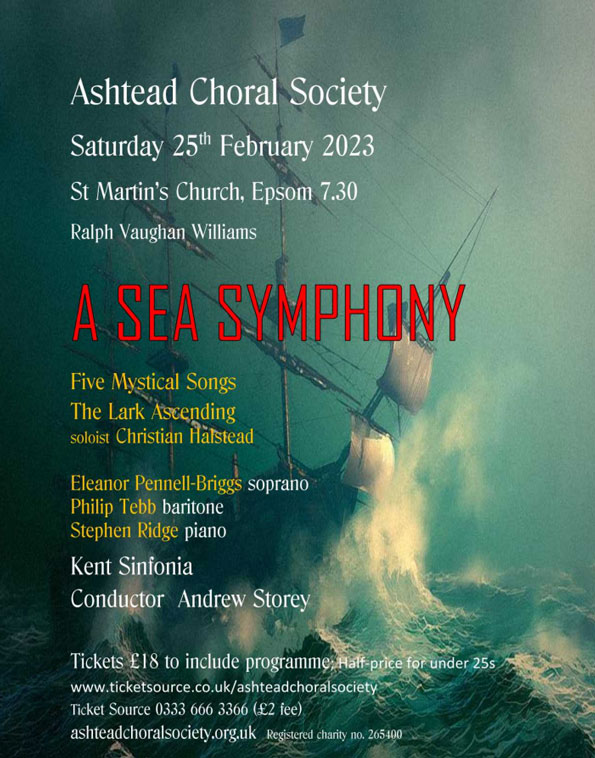

Ashtead Choral Society
A Sea Symphony
Five Mystical Songs
The Lark Ascending
Ralph Vaughan Williams
25 February 2023
Andrew Storey conducts the Ashtead Choral Society with enthusiasm and vigour, presenting them at their best in this delightful programme, showing off a range of music by Ralph Vaughan Williams in the 150th anniversary year of his birth.
Starting the evening with Vaughan Williams’ Five Mystical songs, the choir began with a warm and harmonious sound, which remained well balanced and well blended throughout the evening. Accompanied solely by Stephen Ridge on the piano, the sound filled the wonderful acoustics of St Martin’s Church in Epsom. The choir provided excellent support to the baritone soloist, Daniel Tate, who gave an especially commendable performance as a last minute stand-in, and whose tone and clarity propelled the storytelling of RVW’s Mystical Songs. The choir especially shone as the focal point in the 3rd song, demonstrating a beautiful understanding of tonality, and picked up the pace for the 5th song – the well-known ‘Let all the world’ – with an injection of energy to finish off.
The second piece of the evening was The Lark Ascending, played by The Kent Sinfonia with Christian Halstead as lead and violin soloist. As one of Vaughan Williams’ most famous pieces, and an award-winning performance behind Halstead, the audience had a lot to look forward to, and it was as outstanding as we could have imagined! The orchestra crafted a full-bodied sound and yet took no attention away from the exquisite violin solo, which had the audience mesmerised.
The second half began the titular piece of the evening, Vaughan Williams’ Sea Symphony. Demonstrating strong entries all round, the choir and orchestra provided a majestic sound, with especially impressive lone chorus entries standing up to the magnificent sound of the orchestra. We also had our first entry of the soprano soloist Eleanor Pennell-Briggs, who gave another sparkling performance. My own conductor often tells me that “Musicians must be actors!”, which both soloists and ACS demonstrated beautifully this evening, conveying the power and emotion of the sea.
The symphony continues with some elegant call and response passages, well executed by both choir and orchestra, and it was especially pleasing when the main melody passes around the orchestra sections. The scherzo then starts, feeling energetic and urgent, with the chromatic passages handled with great skill and empathy by the choir. The dynamic contrasts by both parties provide drama, again echoing the feelings of the sea.
The final movement begins cinematic and sweeping, with precision by the chorus when they are left exposed. There is power when the basses sing alone, with a great contrast to the delicate female voices. The orchestra and soloists have a moment to shine on their own, with both soloists again demonstrating exceptional storytelling, before the chorus returns for the start of the finale. The regal fanfare from the horns and the vivid energy from the choir draws to a close to finish up the piece.
Overall both ACS and Kent Sinfonia provided a thoroughly enjoyable evening, showcasing a range of musical talent and shining a spotlight onto Ralph Vaughan Williams.
Review by Lizzie McCaffrey
Pirates of Penzance
Trial by Jury
Gilbert & Sullivan
8 October 2022
We began our 2022-23 season on 8th October in the Epsom Playhouse with concert versions of Pirates of Penzance and Trial by Jury, operettas by Gilbert and Sullivan. A rip roaring evening of melodies and Gilbert-esque story lines, with the Kent Sinfonia and soloists Kathleen Nic Dhairmada, Susan Legg, Mark Nathan and Jeff Stewart.

Ashtead Choral Society
Pirates of Penzance
Trial by Jury
Gilbert & Sullivan
8 October 2022
An evening of legal machinations and romantic entanglements!!
The Pirates of Penzance combines romance and mock heroics as a “Rollicking Band” of reluctant Pirates encounter a Major General, his daughters and a terrified Police Force. A Leap Year paradox leads to a dramatic revelation and a burst of patriotic fervour. What better way to celebrate a Jubilee?
The one-act Trial by Jury illustrates the absurdity of the defence to Breach of Promise of Marriage (subject to litigation for damages until the 20th century). The Judge, the epitome of bias, finds a solution to the dilemma – to the agreement of both parties.
Conducted by Andrew Storey, with Kent Sinfonia and soloists Mark Nathan (baritone) and Jeff Stewart (tenor) – who both grew up locally – we were also delighted to welcome Susan Legg (alto) and Kathleen Nic Dhairmada (soprano).
Messiah
Handel
23 April 2022
No matter how many times one has heard Handel’s ‘Messiah’, if it is sung well, as it certainly was here there is always something new to savour while simultaneously rejoicing in the many highlights of this cherished score. The concert was dedicated to the people of Ukraine, and a collection for the Disasters Emergency Committee raised £1,350 on the evening, which commenced with the Ukrainian National Anthem, played majestically and poignantly on the church’s organ by Lucy Morrell of the Kent Sinfonia…
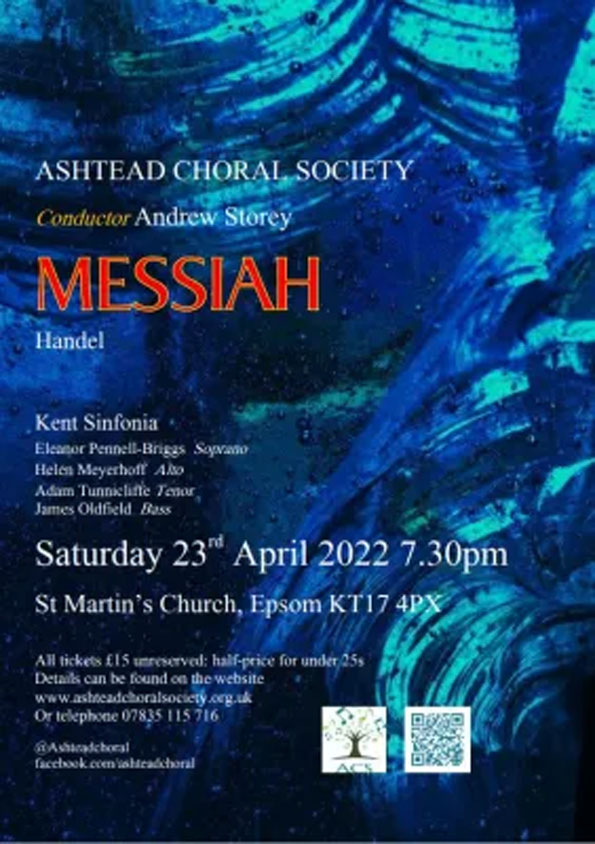
Ashtead Choral Society
Messiah
Handel
23 April 2022
No matter how many times one has heard Handel’s Messiah, if it is sung well, as it certainly was here there is always something new to savour while simultaneously rejoicing in the many highlights of this cherished score. The concert was dedicated to the people of Ukraine, and a collection for the Disasters Emergency Committee raised £1,350 on the evening, which commenced with the Ukrainian National Anthem, played majestically and poignantly on the church’s organ by Lucy Morrell.
Under the vigorous baton of Andrew Storey there was excellence on display in every department. The small orchestra of only about twenty players, under the brilliant leadership of Christian Halstead, gave a superb rendition of the Overture and never flagged at all during this demanding marathon. Tenor Adam Tunnicliffe’s opening solo ‘Comfort ye my people’ was confident and commanding, setting the tone for the rest of the evening’s singing.
Ashtead Choral Society were on explosive form from the outset with a wonderful sound which was sustained throughout the whole performance with astonishing energy and stamina right to the very end. All four voices were well drilled, with immaculate diction, precise entries, sensitive to dynamics, revelling in the text. None of the favourites disappointed: ‘And the glory of the Lord’, ‘For unto us a child is born’, ‘Hallelujah’, of course, ‘Worthy is the Lamb that was slain’, all memorable. It must be said that the tenors seemed to enjoy the most as sheep that have gone astray!
Soprano Eleanor Pennell-Briggs sang with elegance but also fire as her voice soared in St Martin’s generous acoustic. ‘I know that my Redeemer liveth’ was a special highlight. Mezzo-soprano Helen Meyerhoff was a joy in all her contributions with fine diction and sensitive handling of the text. Bass James Oldfield offered creamy textures to his solo items, pride of place of which must go to ‘The people that walked in darkness’.
The whole evening was a credit to Andrew Storey in particular, but also the commitment over many rehearsals, stunning stamina of the whole choir, and not least the excellent support during those rehearsals of piano wizard Stephen Ridge.
Written by Bernard Raymond
Elijah
Mendelssohn
5 February 2022
And so it came to pass that, as the UK seemed to be emerging from two years in the wilderness as a result of the Covid pandemic, Ashtead Choral Society’s long-postponed 70th anniversary performance of Mendelssohn’s Elijah took place on 5 February at Dorking Halls – but – would anyone come to listen? Would there be any sign of a crowd, let alone a cloud?
We needn’t have worried, as the audience seats filled up and the lights dimmed to greet the arrival of the soloists along with conductor Andrew Storey…
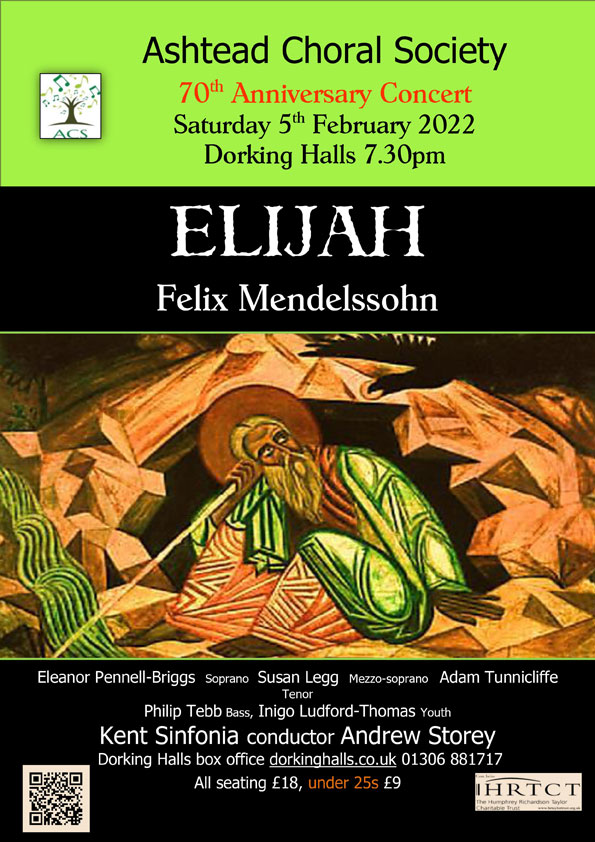
Ashtead Choral Society
Elijah
Mendelssohn
5 February 2022
And so it came to pass that, as the UK seemed to be emerging from two years in the wilderness as a result of the Covid pandemic, Ashtead Choral Society’s long-postponed 70th anniversary performance of Mendelssohn’s Elijah took place on 5 February at Dorking Halls – but – would anyone come to listen? Would there be any sign of a crowd, let alone a cloud??
We needn’t have worried, as the audience seats filled up and the lights dimmed to greet the arrival of the soloists along with conductor Andrew Storey.
The portentous minor chords and the tritones (the devil’s interval) which open the work emphasised that Elijah (the excellent Philip Tebb, of whom more later) was not bringing good news. One aspect which was maintained throughout the performance was the excellent diction and characterisation displayed by ACS, which ran the full gamut of emotions from despair at the outset, through frustration and anger to gratitude and praise. In this they were ably supported by the Kent Sinfonia, whose enthusiasm was never in doubt. Special mention to the brass section and particularly to the principal cello.
The initial section of the work introduces the remaining adult soloists (Eleanor Pennell-Briggs (soprano), Adam Tunnicliffe (tenor), and, standing in at short notice for the indisposed Susan Legg, Susanna Spicer (mezzo)). All contributed well to the evening and your reviewer was particularly taken by the point at which Ms Spicer, in the character of Jezebel the Queen, turned to point directly at Elijah in one of her recitatives!
Highlights of the first half were the Baal choruses when ACS illustrated the increasing desperation of the priests of Baal, faced by that god’s continued failure to put in an appearance, and the closing section “Open the heavens and send us relief” which was beautifully paced by conductor Andrew Storey to allow the interaction between Elijah and the Youth (the delightful and pure-voiced Taylor Lai who was also performing at very short notice – and possibly after his normal bedtime?)
So the cloud and the rains came, and with ACS fortified by the rushing waters, and the audience perhaps by something a little stronger, the evening continued. Philip Tebb gave us a beautiful performance of “It is enough”, the ladies of ACS were outstanding (and bang in tune) through the unaccompanied trio “Lift thine eyes”, and the full chorus, voices apparently undimmed, took us energetically through the final few choruses (each of which can be described as “a big sing”).
The final fugue (now in the major key) concludes in triumphant style, but the reappearance of the tritones in the last few bars suggests that it may not always be plain sailing ahead for the children of Israel…. Hopefully there will be no such problems for ACS as they head towards the well-charted waters of Messiah, in St Martin’s church, Epsom, on 23 April.
Review by ‘The Warrior’
What the audience said…
Great performance of Mendelssohn’s Elijah in Dorking Halls last night for their 70th Anniversary. I hope there was much celebration afterwards at having crossed the line finally after 2 years of persistence
We hadn’t heard Elijah before – what wonderful story telling and atmosphere. We’re looking forward to the next one!
Masters in Concert
Beethoven & Mozart
9 October 2021
After what seems like forever, Ashtead Choral Society were able to return to live music-making in St Martin’s, Epsom, on 9 October. Ably supported by the Kent Sinfonia and a range of soloists, ACS, and their Music Director Dr Andrew Storey, treated us to a programme of Beethoven and Mozart…
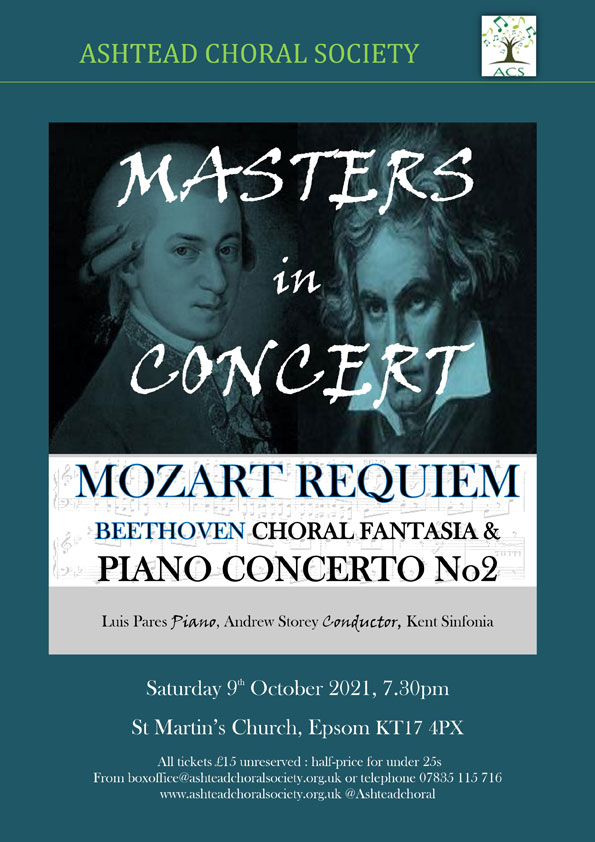
Ashtead Choral Society
Masters in Concert
Beethoven & Mozart
9 October 2021
After what seems like forever, Ashtead Choral Society were able to return to live music-making in St Martin’s, Epsom, on 9 October. Ably supported by the Kent Sinfonia and a range of soloists, ACS, and their Music Director Dr Andrew Storey, treated us to a programme of Beethoven and Mozart.
Beethoven’s rarely-performed “Choral Fantasia” is a sort of mini piano concerto combined with ideas that later were included in the Ninth Symphony, and the extensive instrumental introduction gave us a promise of things to come from the Kent Sinfonia, along with the outstanding keyboard technique of pianist Luis Pares. ACS, with interjections from the vocal solo quartet, coped admirably with the unfamiliar German text, and a well-balanced sound carried us all, at quite a pace, to a rousing conclusion.
The rest of the first half gave us more Beethoven and – even better – more piano! The inspired playing of Luis Pares treated us to clarity, energy, and a remarkable cadenza in the first movement of Beethoven’s Second Piano Concerto, followed by a slow movement with delicate interpretation and finesse from both soloist and orchestra. The final rondo sparkled like a fine champagne with Pares challenging the orchestra to keep up with his flying fingers. Just one thought – a gentle solo encore would perhaps have been nice?
The second half brought us Mozart’s “Requiem”. This was a well-constructed and well-paced performance, ably directed by Andrew Storey. The vocal quartet of Lucy Cox, Susan Legg, Ed Saklatvala and James Oldfield were all on top of their game and it would be invidious to single out anyone for special praise. One person deserves a special mention though – the excellent playing of the Kent Sinfonia throughout the evening was topped off by an outstanding trombone solo in the “Tuba mirum”.
And what of the chorus? After almost two years away, they were better than ever. Confident entries, bright vowels, subtle dynamics – you could tell they were glad to be back, and the cheers ringing around the church when ACS took their bow at the end showed that the audience felt the same way …
Bring on “Elijah” in the Dorking Halls, on 5 February 2022!
Review by ‘The Warrior’
What the audience said…
The Mozart Requiem was the best I have heard Ashtead Choral Society Sing. Excellent diction, fantastic, vibrant sound which had energy and showed off superb dynamic contrasts
Ashtead Choral were on top form in Beethoven’s Choral Fantasia. They drove the piece on to its frenzied, somewhat chaotic, conclusion with style and panache
Luis Pares played with such style, virtuosity and panache beautifully accompanied by the Kent Sinfonia, directed by Andrew Storey. A brilliant evening.
